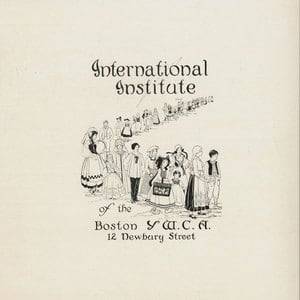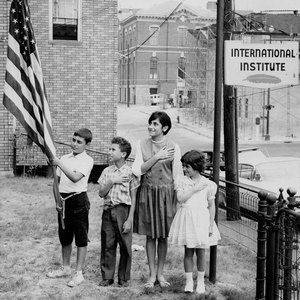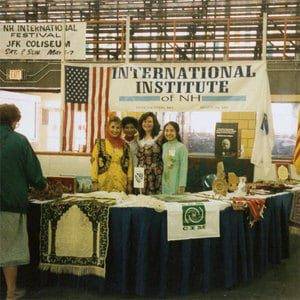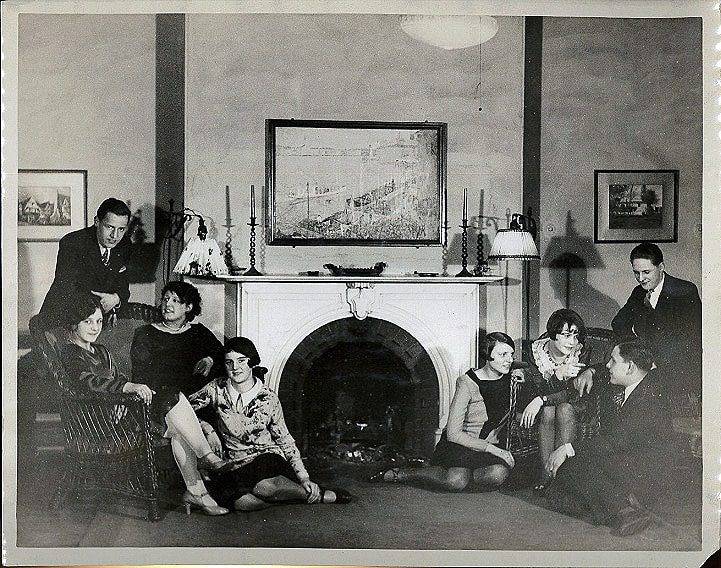Our mission
The mission of the International Institute of New England is to create opportunities for refugees and immigrants to succeed through resettlement, education, career advancement and pathways to citizenship.
Our vision
Refugees and immigrants are able to realize their dreams and contribute to New England’s growth and prosperity.
Our values
• Empathy, compassion and respect for all we serve and each other
• Diversity and inclusion in our workplace, leadership, and communities
• Continuous improvement and a relentless focus on successful, data-driven outcomes, one individual at a time
• Collaboration and partnership with each other and our stakeholders
• Self-sufficiency for the people we serve and for our organization
• Fearless commitment to our humanitarian mission

First graphic representation of the IINE-Boston site while still a part of the YWCA. (1930s)

Children pledging allegiance outside the IINE-Lowell site. (1964)

IINE-Manchester site participating in the New Hampshire International Festival. (1995)
Our History
The History of the International Institute of New England
The International Institute of New England has been welcoming refugees and immigrants to Massachusetts and New Hampshire for more than a century.
Our movement began in 1910 when the Young Women’s Christian Association (YWCA) created the Department of Immigration and Foreign Communities to oversee field projects called “International Institutes” to serve the nation’s growing foreign-born population. The Institutes offered multilingual social services for women and girls and became known as Red Feather Agencies.
IINE-Lowell was founded as part of the John Street YWCA in 1918, and in 1924, the International Institute of Boston

A group of folks at an International Institute of New England Party in 1929.
was established at the YWCA then located at 12 Newbury Street. The Institutes separated from the YWCA in 1935, and over the ensuing decades hundreds of community groups, individuals, corporations, and foundations joined forces with the International Institute to help new Americans integrate into New England. The International Institute of New Hampshire was founded in 1994 as a reorganization, continuation, and expansion of existing services in place since 1987. In 2001 the three sites became one consolidated organization – The International Institute of New England.
Throughout our more than ten decades of service to New England, tens of thousands of new Americans have connected to the International Institute to learn English, meet other new Americans, learn about the culture of their new country, gain job skills, and receive assistance in finding employment. Historically and today, we work with local communities to help refugees and immigrants find places to settle and restart their lives.
Our history has paralleled the immigrant journey in America. In the first half of the 20th century, we welcomed and served many people from Europe. In the 1970s, the rise of the Khmer Rouge and the fall of Saigon brought thousands of people from Cambodia and Vietnam to Lowell and Boston, where they were welcomed by our staff. In the 1990s, Bosnian refugees, Kurds fleeing Iraq, and Kosovars fleeing Serbian aggression came to our doors, and in the 21st century, we have welcomed and aided people from Iraq, Bhutan, Somalia, the Democratic Republic of Congo and other countries in Africa, South and Southeast Asia, the nations of South and Central America, and most prominently, from Afghanistan, Ukraine, and Haiti.
Today, the International Institute of New England offers humanitarian relief, English language learning, employment, skills training, and immigration legal services to more than 10,000 people from 70+ different countries.
From its beginning to the present, the International Institute of New England has assisted each new wave of refugees and immigrants from all over the world and served as a center of hospitality for many ethnic groups. IINE has also invested in the revitalization of local communities throughout New England by receiving, supporting, educating, training, and job placing an ambitious and diverse workforce. With continued partnership from community groups and philanthropists throughout New England, IINE will continue this service for the next 100 years and beyond.


